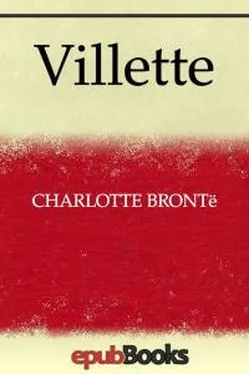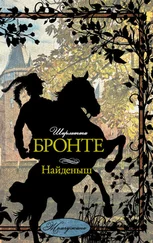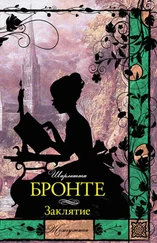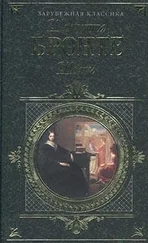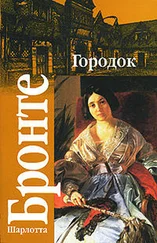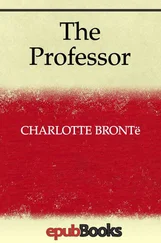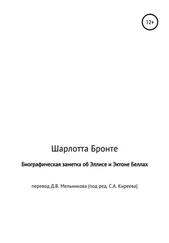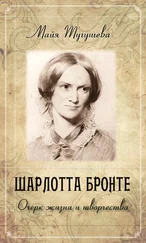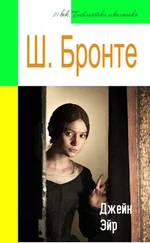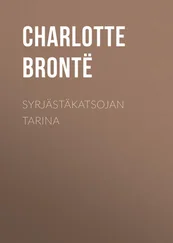Шарлотта Бронте - Villette
Здесь есть возможность читать онлайн «Шарлотта Бронте - Villette» — ознакомительный отрывок электронной книги совершенно бесплатно, а после прочтения отрывка купить полную версию. В некоторых случаях можно слушать аудио, скачать через торрент в формате fb2 и присутствует краткое содержание. Год выпуска: 2014, Издательство: epubBooks Classics, Жанр: Исторические любовные романы, на английском языке. Описание произведения, (предисловие) а так же отзывы посетителей доступны на портале библиотеки ЛибКат.
- Название:Villette
- Автор:
- Издательство:epubBooks Classics
- Жанр:
- Год:2014
- ISBN:нет данных
- Рейтинг книги:3 / 5. Голосов: 1
-
Избранное:Добавить в избранное
- Отзывы:
-
Ваша оценка:
- 60
- 1
- 2
- 3
- 4
- 5
Villette: краткое содержание, описание и аннотация
Предлагаем к чтению аннотацию, описание, краткое содержание или предисловие (зависит от того, что написал сам автор книги «Villette»). Если вы не нашли необходимую информацию о книге — напишите в комментариях, мы постараемся отыскать её.
Villette — читать онлайн ознакомительный отрывок
Ниже представлен текст книги, разбитый по страницам. Система сохранения места последней прочитанной страницы, позволяет с удобством читать онлайн бесплатно книгу «Villette», без необходимости каждый раз заново искать на чём Вы остановились. Поставьте закладку, и сможете в любой момент перейти на страницу, на которой закончили чтение.
Интервал:
Закладка:
I turned from the group of trees and the "merrie companie" in its shade. Midnight was long past; the concert was over, the crowds were thinning. I followed the ebb. Leaving the radiant park and well–lit Haute–Ville (still well lit, this it seems was to be a "nuit blanche" in Villette), I sought the dim lower quarter.
Dim I should not say, for the beauty of moonlight—forgotten in the park—here once more flowed in upon perception. High she rode, and calm and stainlessly she shone. The music and the mirth of the fête, the fire and bright hues of those lamps had out–done and out–shone her for an hour, but now, again, her glory and her silence triumphed. The rival lamps were dying: she held her course like a white fate. Drum, trumpet, bugle, had uttered their clangour, and were forgotten; with pencil–ray she wrote on heaven and on earth records for archives everlasting. She and those stars seemed to me at once the types and witnesses of truth all regnant. The night–sky lit her reign: like its slow–wheeling progress, advanced her victory—that onward movement which has been, and is, and will be from eternity to eternity.
These oil–twinkling streets are very still: I like them for their lowliness and peace. Homeward–bound burghers pass me now and then, but these companies are pedestrians, make little noise, and are soon gone. So well do I love Villette under her present aspect, not willingly would I re–enter under a roof, but that I am bent on pursuing my strange adventure to a successful close, and quietly regaining my bed in the great dormitory, before Madame Beck comes home.
Only one street lies between me and the Rue Fossette; as I enter it, for the first time, the sound of a carriage tears up the deep peace of this quarter. It comes this way—comes very fast. How loud sounds its rattle on the paved path! The street is narrow, and I keep carefully to the causeway. The carriage thunders past, but what do I see, or fancy I see, as it rushes by? Surely something white fluttered from that window—surely a hand waved a handkerchief. Was that signal meant for me? Am I known? Who could recognise me? That is not M. de Bassompierre's carriage, nor Mrs. Bretton's; and besides, neither the Hôtel Crécy nor the château of La Terrasse lies in that direction. Well, I have no time for conjecture; I must hurry home.
Gaining the Rue Fossette, reaching the pensionnat, all there was still; no fiacre had yet arrived with Madame and Désirée. I had left the great door ajar; should I find it thus? Perhaps the wind or some other accident may have thrown it to with sufficient force to start the spring–bolt? In that case, hopeless became admission; my adventure must issue in catastrophe. I lightly pushed the heavy leaf; would it yield?
Yes. As soundless, as unresisting, as if some propitious genius had waited on a sesame–charm, in the vestibule within. Entering with bated breath, quietly making all fast, shoelessly mounting the staircase, I sought the dormitory, and reached my couch.
Ay! I reached it, and once more drew a free inspiration. The next moment, I almost shrieked—almost, but not quite, thank Heaven!
Throughout the dormitory, throughout the house, there reigned at this hour the stillness of death. All slept, and in such hush, it seemed that none dreamed. Stretched on the nineteen beds lay nineteen forms, at full–length and motionless. On mine—the twentieth couch—nothing ought to have lain: I had left it void, and void should have found it. What, then; do I see between the half–drawn curtains? What dark, usurping shape, supine, long, and strange? Is it a robber who has made his way through the open street–door, and lies there in wait? It looks very black, I think it looks—not human. Can it be a wandering dog that has come in from the street and crept and nestled hither? Will it spring, will it leap out if I approach? Approach I must. Courage! One step!—
My head reeled, for by the faint night–lamp, I saw stretched on my bed the old phantom—the NUN.
A cry at this moment might have ruined me. Be the spectacle what it might, I could afford neither consternation, scream, nor swoon. Besides, I was not overcome. Tempered by late incidents, my nerves disdained hysteria. Warm from illuminations, and music, and thronging thousands, thoroughly lashed up by a new scourge, I defied spectra. In a moment, without exclamation, I had rushed on the haunted couch; nothing leaped out, or sprung, or stirred; all the movement was mine, so was all the life, the reality, the substance, the force; as my instinct felt. I tore her up—the incubus! I held her on high—the goblin! I shook her loose—the mystery! And down she fell—down all around me—down in shreds and fragments—and I trode upon her.
Here again—behold the branchless tree, the unstabled Rosinante; the film of cloud, the flicker of moonshine. The long nun proved a long bolster dressed in a long black stole, and artfully invested with a white veil. The garments in very truth, strange as it may seem, were genuine nun's garments, and by some hand they had been disposed with a view to illusion. Whence came these vestments? Who contrived this artifice? These questions still remained. To the head–bandage was pinned a slip of paper: it bore in pencil these mocking words—
"The nun of the attic bequeaths to Lucy Snowe her wardrobe. She will be seen in the Rue Fossette no more."
And what and who was she that had haunted me? She, I had actually seen three times. Not a woman of my acquaintance had the stature of that ghost. She was not of a female height. Not to any man I knew could the machination, for a moment, be attributed.
Still mystified beyond expression, but as thoroughly, as suddenly, relieved from all sense of the spectral and unearthly; scorning also to wear out my brain with the fret of a trivial though insoluble riddle, I just bundled together stole, veil, and bandages, thrust them beneath my pillow, lay down, listened till I heard the wheels of Madame's home–returning fiacre, then turned, and worn out by many nights' vigils, conquered, too, perhaps, by the now reacting narcotic, I deeply slept.
Chapter XL.
The Happy Pair.
The day succeeding this remarkable Midsummer night, proved no common day. I do not mean that it brought signs in heaven above, or portents on the earth beneath; nor do I allude to meteorological phenomena, to storm, flood, or whirlwind. On the contrary: the sun rose jocund, with a July face. Morning decked her beauty with rubies, and so filled her lap with roses, that they fell from her in showers, making her path blush: the Hours woke fresh as nymphs, and emptying on the early hills their dew–vials, they stepped out dismantled of vapour: shadowless, azure, and glorious, they led the sun's steeds on a burning and unclouded course.
In short, it was as fine a day as the finest summer could boast; but I doubt whether I was not the sole inhabitant of the Rue Fossette, who cared or remembered to note this pleasant fact. Another thought busied all other heads; a thought, indeed, which had its share in my meditations; but this master consideration, not possessing for me so entire a novelty, so overwhelming a suddenness, especially so dense a mystery, as it offered to the majority of my co–speculators thereon, left me somewhat more open than the rest to any collateral observation or impression.
Still, while walking in the garden, feeling the sunshine, and marking the blooming and growing plants, I pondered the same subject the whole house discussed.
What subject?
Merely this. When matins came to be said, there was a place vacant in the first rank of boarders. When breakfast was served, there remained a coffee–cup unclaimed. When the housemaid made the beds, she found in one, a bolster laid lengthwise, clad in a cap and night–gown; and when Ginevra Fanshawe's music–mistress came early, as usual, to give the morning lesson, that accomplished and promising young person, her pupil, failed utterly to be forthcoming.
Читать дальшеИнтервал:
Закладка:
Похожие книги на «Villette»
Представляем Вашему вниманию похожие книги на «Villette» списком для выбора. Мы отобрали схожую по названию и смыслу литературу в надежде предоставить читателям больше вариантов отыскать новые, интересные, ещё непрочитанные произведения.
Обсуждение, отзывы о книге «Villette» и просто собственные мнения читателей. Оставьте ваши комментарии, напишите, что Вы думаете о произведении, его смысле или главных героях. Укажите что конкретно понравилось, а что нет, и почему Вы так считаете.
